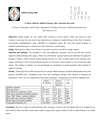Does Epididymal Induration Predict the Need for Epididymovasostomy at Vasectomy Reversal?
S Cayan and PJ Turek Department of Urology,
University of California San Francisco, San Francisco, CA.
Objectives
Very few clinical parameters correlate well with the need to perform epididymovasostomy (EV) during vasectomy reversal procedures. In addition to the time interval from vasectomy to reversal, the presence of a sperm granuloma is helpful in counseling patients in this regard. We assess whether the presence of dilated epididymides on physical examination can further inform surgeons on this issue.
Design
Case controlled retrospective analysis of a consecutive series of patients.
“…Epididymal induration on preoperative exam for vasectomy reversal surgery is associated with a longer obstructive interval after vasectomy. ”
– Dr. Paul Turek
Materials and Methods
From the last 80 patients who underwent vasectomy reversal by a single surgeon, data on the presence or absence of epididymal induration was recorded on individual testicular units. Epididymal induration was defined as an enlarged or tense (but not necessarily tender) epididymis. This information was correlated with the type of reversal procedure performed and the intraoperative findings. EV’s were performed in the absence of sperm at the testicular vas deferens. Unpaired t tests were used for statistical comparisons.
Results
Findings are provided in the table in the downloadable PDF.
Conclusion
Epididymal induration on preoperative exam for vasectomy reversal surgery is associated with a longer obstructive interval after vasectomy. With this finding, the likelihood of EV surgery doubles. This information may supplement other data used in counseling these patients.










